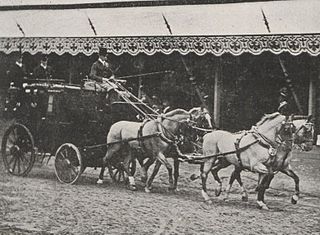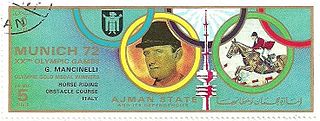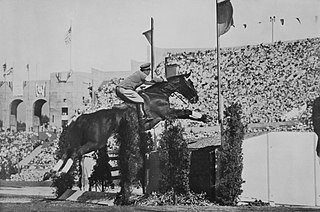Five equestrian competitions were held from 29 May to 2 June 1900 at the Concours Hippique International in Paris as part of the Exposition Universelle. The events were later classified as part of the 1900 Summer Olympics. The events were organised by the Société hippique française, with competitors from eight countries competing in three jumping and two driving events at the Place de Breteuil in the 7th arrondissement of Paris.

At the 1900 Summer Olympics one gymnastics event for men was contested. The competition was held on Sunday, 29 July 1900, and on Monday, 30 July 1900. There were 135 competitors from 8 nations. The top 18 places were taken by French gymnasts, of which there were more than 100. The event was won by Gustave Sandras, with Noël Bas finishing second and Lucien Démanet third. The highest-placing foreign gymnast was Jules Ducret of Switzerland, in a tie for 19th place.

The men's triple jump was a track & field athletics event at the 1900 Summer Olympics in Paris. It was held on July 16, 1900. 13 athletes from six nations competed. The event was won by Myer Prinstein of the United States, the nation's second consecutive victory in the men's triple jump. Prinstein became the first, and through the 2016 Games, only, person to have won both the long jump and the triple jump. James Brendan Connolly took second, making him the first man to medal twice in the triple jump. Lewis Sheldon finished third, completing what would later be known as a medal sweep.

Italy competed at the 1900 Summer Olympics in Paris, France.

Equestrian sports were first included in the Olympic Games in the Summer Olympics of 1900 in Paris. They were again included in 1912, and have been included in every subsequent edition of the Games. Currently, the Olympic equestrian disciplines are dressage, eventing, and show jumping. In each discipline, both individual and team medals are awarded. Since the XV Olympiad in Helsinki in 1952, women and men compete on equal terms.

The individual show jumping was an equestrian event held as part of the Equestrian at the 1964 Summer Olympics programme. The event was held on 24 October. There were 46 competitors from 17 nations. Each nation could have up to three riders. The event was won by Pierre Jonquères d'Oriola of France, the first rider to win two gold medals in individual jumping; he did so 12 years apart, with his first in 1952. It was France's third gold medal in the event overall, moving out of a tie with Italy at two for most all-time. Hermann Schridde, representing the United Team of Germany, took silver. Great Britain earned its second consecutive bronze in the event, this time with Peter Robeson taking the honors.

The individual show jumping was an equestrian event held as part of the Equestrian at the 1912 Summer Olympics programme. The competition was held on 16 July 1912 as the Stockholm Olympic Stadium. There were 31 competitors from 8 nations. Each nation was limited to a maximum of six riders. The event was won by Jacques Cariou of France, the nation's first victory in the individual jumping. The victory came with a challenge prize presented by Count Gyula Andrássy the Younger of Hungary. Rabod von Kröcher earned Germany's first medal in the event with his silver. Emmanuel de Blommaert of Belgium took bronze.

Obstacle jumping was one of five equestrian competitions held in late May and early June 1900 at the International Horse Show in Paris. The event was part of the Exposition Universelle, and later classified as part of the 1900 Summer Olympics. It was similar to the modern show jumping event. 45 competitors entered, though only 37 competed, with some information unknown. The event was won by Aimé Haegeman of Belgium, with his countryman Georges Van Der Poele taking second and Louis de Champsavin of France in third.

The high jump was one of five equestrian competitions held in late May and early June 1900 at the International Horse Show in Paris. The event was part of the Exposition Universelle, and later classified as part of the 1900 Summer Olympics. It is the only Olympic Games to date to feature an equestrian high jump competition. Nineteen competitors entered the high jump competition, although not all details have been discovered.

The "hacks and hunter combined", also known as the "chevaux de selle", was one of five equestrian competitions held in late May and early June 1900 at the International Horse Show in Paris. The event was part of the Exposition Universelle, and later classified as part of the 1900 Summer Olympics. It is unknown how many riders competed. The top four placers are known, as are about half the remaining riders who competed, including three women. As an upper limit, 50 men and 1 woman are listed as entrants in the Official Report, but it is almost certain that not all actually competed.

The four-in-hand mail coach driving was one of five equestrian competitions held in late May and early June 1900 at the International Horse Show in Paris. The event was part of the Exposition Universelle, and later classified as part of the 1900 Summer Olympics. There were 31 entrants listed for the event; all 28 of them are known by name. The event was won by the team of Georges Nagelmackers of Belgium. The teams of Léon Thome and Jean de Neuflize, both of France, were classified in second and third place respectively.

The individual show jumping event was part of the equestrian programme at the 1920 Summer Olympics. The competition was held on 12 September at the Olympisch Stadion in Antwerp. There were 25 competitors from 6 nations. The event was won by Tommaso Lequio di Assaba of Italy, with his teammate Alessandro Valerio earning silver. Carl Gustaf Lewenhaupt of Sweden took bronze. They were the first medals in individual jumping for both nations.

Dominique Maximilien Gardères was a French horse rider who competed in the 1900 Olympic Games. In Paris he tied to the gold medal in the high jump event with Gian Giorgio Trissino.

Count Giovanni Giorgio Trissino was an Italian horse rider who won Italy's first ever gold medal at the Olympic Games in Paris 1900.

The individual show jumping was one of five equestrianism events on the Equestrian at the 1924 Summer Olympics programme. The competition was held on Saturday 27 July 1924. 43 riders from 11 nations competed. Nations were limited to four riders each; the team jumping event used the same results as this competition, with the top three individual scores counting for each national team. The individual event was won by Alphonse Gemuseus of Switzerland, with the nation winning its first victory in its debut in the individual jumping event. Tommaso Lequio di Assaba of Italy became the first person to win multiple medals in the event, taking silver to add to his 1920 gold. Adam Królikiewicz earned Poland's first individual jumping medal with his bronze.

The individual show jumping at the 1928 Summer Olympics took place on 12 August 1928 at the Olympic Stadium in Amsterdam. Scores from the individual competition were summed to give results in the team competition. There were 46 competitors from 16 nations. Each nation could send a team of three riders; 15 nations did so, while Japan had a single rider. The event was won by František Ventura of Czechoslovakia, the nation's first medal in individual jumping. France earned its first medal in the event since 1912 with Pierre Bertran de Balanda's silver. Charles-Gustave Kuhn took bronze, putting Switzerland on the podium for the second consecutive Games.

The individual show jumping in equestrian at the 1972 Summer Olympics in Munich was held at Olympic Stadium on 3 September. It was open to men and women. There were 54 competitors from 21 nations, with two additional non-starters. The event was won by Graziano Mancinelli of Italy, the nation's first victory in individual jumping since 1960 and third overall, tying France for most of all nations. Great Britain extended its podium streak in the event to four Games with Ann Moore's silver. The United States reach the podium for a second straight Games as Neal Shapiro took bronze.

The individual show jumping in equestrian at the 1932 Summer Olympics in Los Angeles was held on 14 August. The event was called the "Prix des Nations" at the time. There were 14 competitors from 4 nations.

The individual show jumping at the 1968 Summer Olympics took place on 23 October. The event was open to men and women. There were 42 competitors from 15 nations. Each nation was limited to three riders. The event was won by William Steinkraus of the United States, the nation's first medal in individual jumping. Marion Coakes of Great Britain was the first female rider to win a medal in individual jumping, taking silver. Great Britain also earned its third consecutive bronze medal in the event, with David Broome earning his second to become the fifth person to win multiple medals in the event.


















